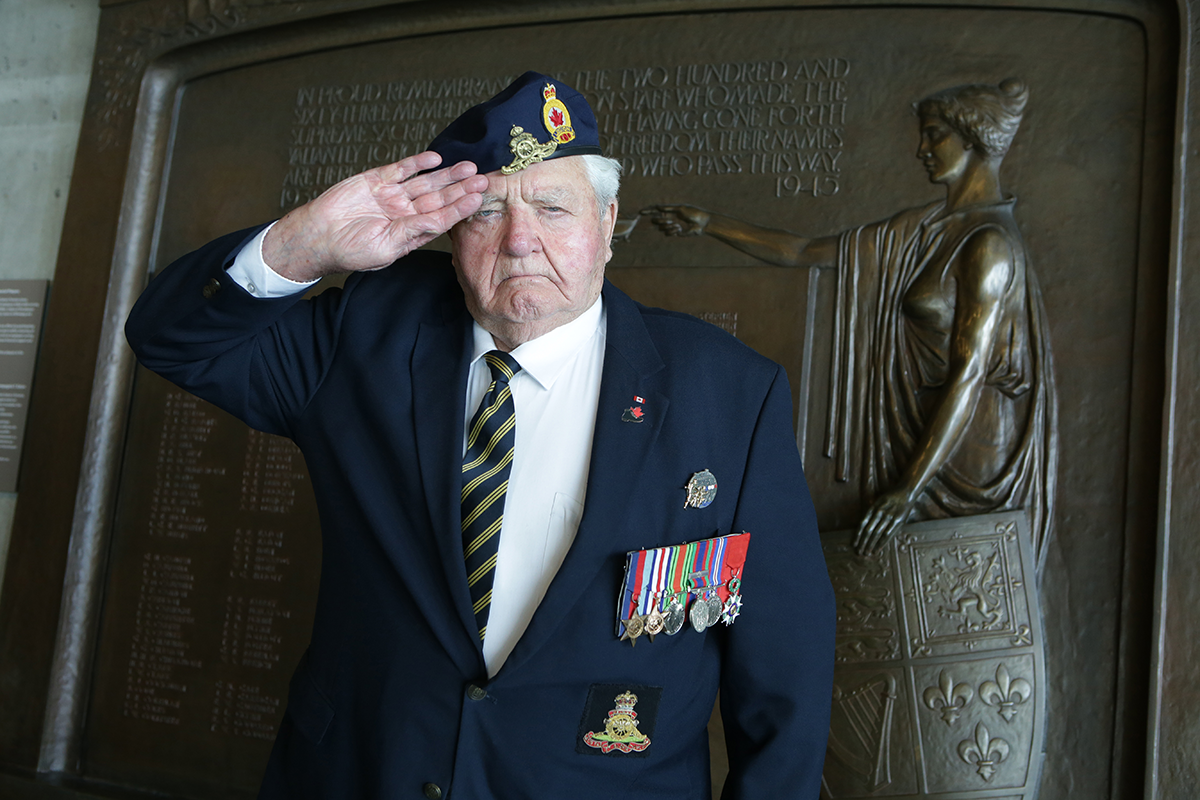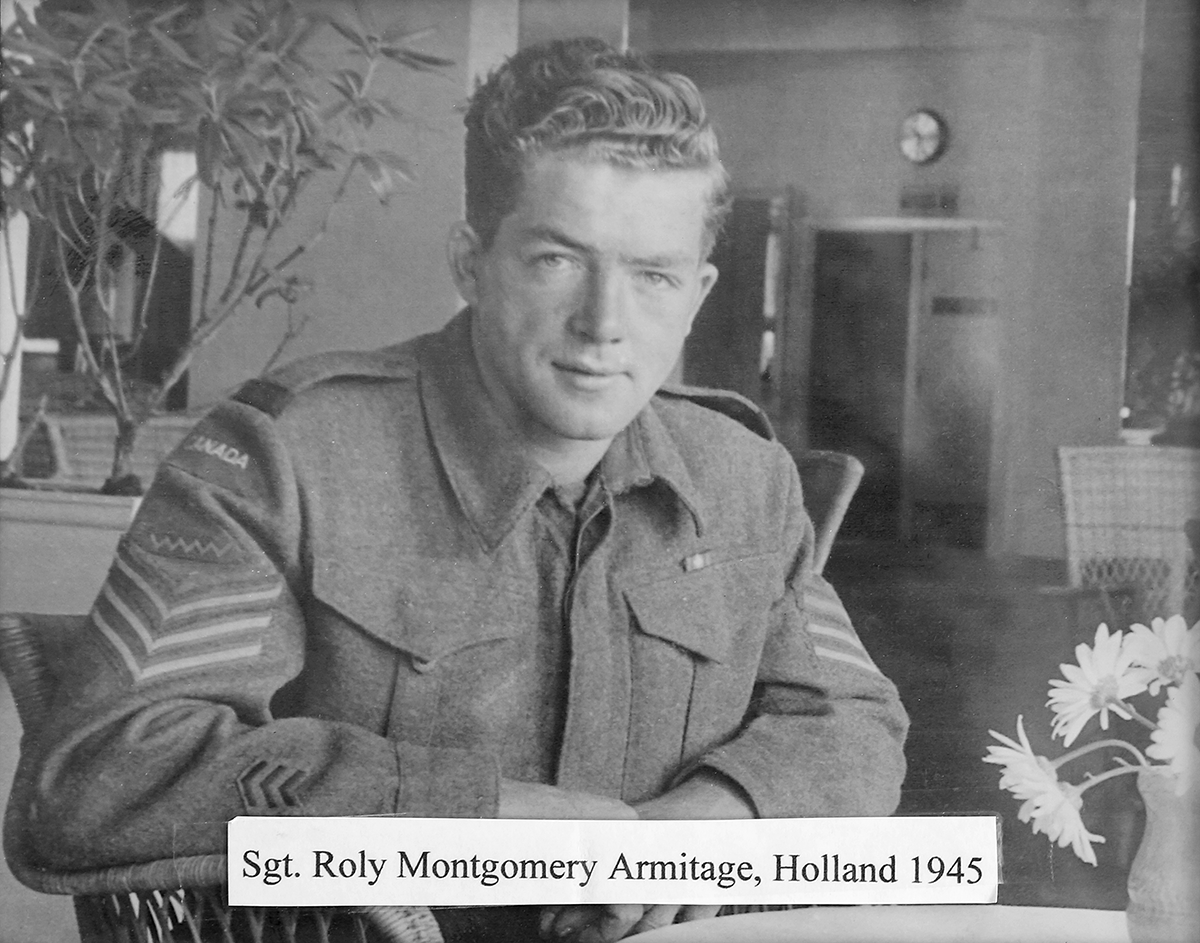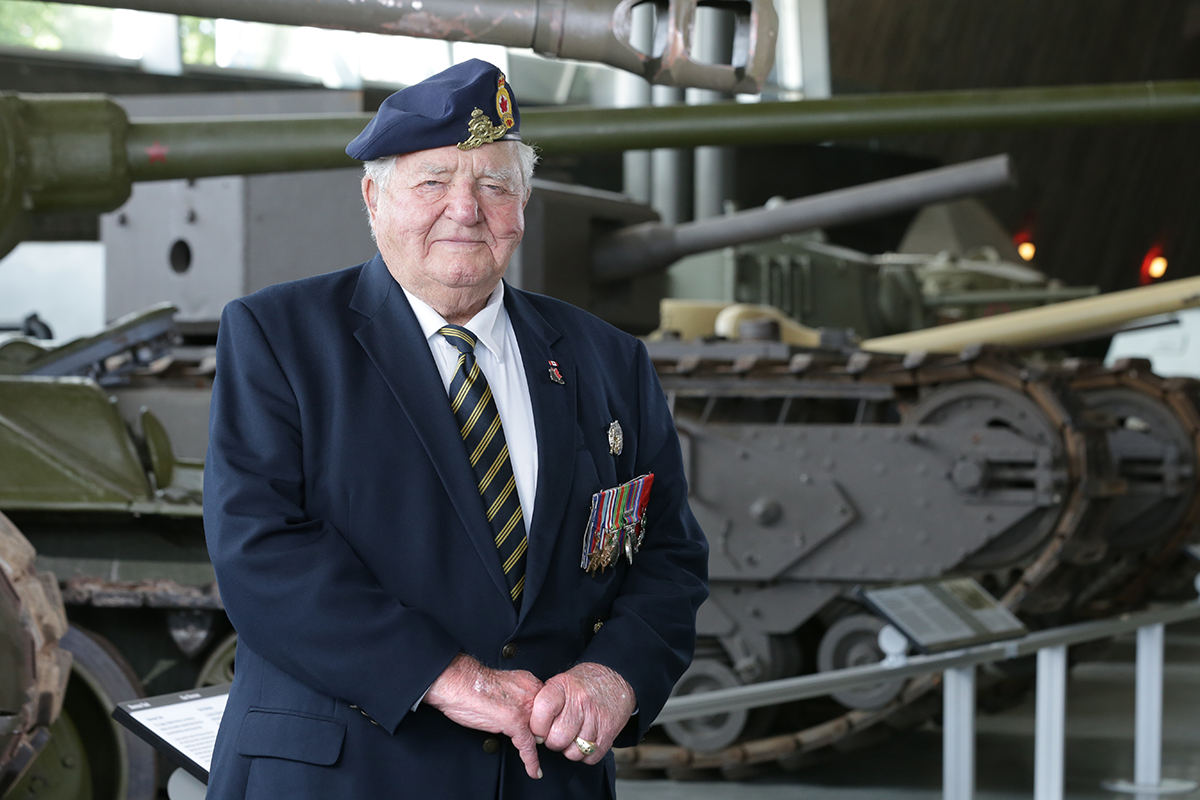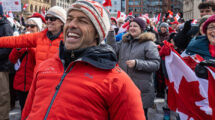
Roland Armitage’s life without limits
By Iris Winston
Photos by John Major
Age has never been a barrier for Dr. Roland Montgomery Armitage.
At just 17 (before he was officially eligible), he joined the army and served in the Second World War, returning from Europe as a decorated veteran. Today, at 94, he remains active in buying, selling and training horses — one of his most loved aspects of a very varied and lengthy career.
“I haven’t retired yet,” says Roly, as he prepares to drive to his son’s farm to view a trotter in training for an upcoming harness race. “I’m in excellent health and still pretty active in the horse business. Retirement’s not for me. I just get a new number every year.”
Proving the point, the Dunrobin, Ontario, resident was one of the forty Canadian veterans who travelled to Juno Beach in France earlier this year as part of the commemoration of the 75th anniversary of D-Day and the Battle of Normandy.
“Everything was extremely well planned and regimented,” says Roly, who was accompanied to the event by his daughter, Ann Webster. “They even had re-enactments by a group of actors.”
He also made a similar trip five years earlier, with his oldest son, Mick, for ceremonies recognizing the 70th anniversary of the battle that ended the Second World War. He also intends to cross the Atlantic again next year to be part of the commemoration of the liberation of the Netherlands.
Roly was among the wounded during the fierce fighting at an earlier battle, as he recounts in The Way it Was and Now, the first of the three books he has written about his life.
By the time the war ended, he had risen to the rank of sergeant and was a highly trained range finder and surveyor. “My mind was active, even though I had only a grade nine education at that time,” he says.
For more than a year after being demobbed, he managed a hotel in Holland, owned by his former superior officer. When he finally returned home in 1946, he was still too young to vote or drink alcohol legally in Canada, despite his active service through the war.
“Just before I came back, my officer advised me to get an education, because he said I could handle it,” recalls Roly. “He was the first person to tell me I was halfways intelligent, so, when I was discharged on January 16, I said I wanted to go to school.”
He attended a special program at a school in Brockville with 10 hours of classes each day and half-days on Saturdays to become a high school graduate.
“Only about 40 per cent [of the students taking the intensive course] survived,” he recalls. “After that, I went on to veterinary school in Guelph.
They took 160 of us and told us we would be down to 100 by the spring. I survived that too and eventually graduated in 1951 with honours.”
That was the beginning of a veterinary career that was to last for the next 52 years. By this time married to his first wife, Mary, and a father, Roly and his family moved to Shawville, Quebec, where he practised for close to 20 years, primarily looking after the needs of the horses hauling logs in remote lumber camps. While living in the area, he was named Citizen of the Year, by the Shawville and District Chamber of Commerce — just one of many honours he was to collect over the years.
Among the most prestigious of these was his being awarded the National Order of the Legion of Honour by France. His wartime decorations include the Defence of Britain medal, the World War II Victory medal, the Canadian Volunteer medal and the Normandy Defence medal. There are many more, springing both from his career as a veterinarian, his business and political interests and his commitment to all aspects of the equine industry.
In 1970, he moved his veterinary practice back to Ontario, operating the clinic from his Dunrobin farm, a short distance from the City of Ottawa.
“The horses came to me and I went to the horses for more than 50 years,” he says, noting that the building that had been the clinic has been incorporated into the farm and training track that are now owned and run by his youngest son, Don.
Roly’s far-reaching care of horses included his being the track veterinarian at Connaught Park, a thoroughbred, steeplechase and harness racing track in Aylmer, Quebec, for a number of years, as well as serving as the president of the Canadian Standardbred Horse Society from 1972 to 1974 and the Canadian Trotting Association from 1974 to 1980.
Among his major achievements in making harness racing safer for the horses and drivers was his having the hub rails removed from the tracks. This was just one of the reasons that Roly was inducted into the Canadian Horse Racing Hall of Fame in 1999, in recognition of his work as an equine vet, a successful horse breeder, owner, administrator and racetrack manager.

Other aspects of a stellar career included his being the general manager of the Rideau Carleton Raceway for nine years (1981 to 1990) and manager of the Carp Airport for 10 (2002 to 2012).
At one point, he was persuaded to try his hand at provincial politics, losing by a handful of votes to the Tory incumbent in the Carleton riding, Norman Sterling, when he ran as a Liberal. Soon afterwards, Roly was elected as the Mayor of West Carleton Township, and served for one term from 1990 to 1994.
“I found out that politics was not for me,” says Roly. “I didn’t enjoy the tit-for-tat aspects and catering to others to get things done, so I didn’t run for a second term.”

However, he left enough of a mark through his time as mayor for his name to be given to the West Carleton community complex, renamed the Dr. Roland Armitage Hall in 2011. In addition, “the father of West Carleton,” as Eli El-Chantiry, the Ottawa city councillor who represents the area, refers to Roly, was honoured with the keys of the City of Ottawa in 2016.
Sadly, Roly has been twice widowed. Cancer claimed both his first wife, Mary, after 38 years of marriage (1947 to 1985) and his second, Karen after 23 (1990 to 2013). He now lives alone, close to his three surviving children (his son Blake died in an accident at 27), four grandchildren and two great-grandchildren.
As he has done for most of his 94 years, he remains active and enthusiastic about life in general and horses in particular. And next on his agenda? Possibly, a fourth memoir. And he certainly plans to travel to Holland for the 50th anniversary of the liberation of the Netherlands.
Did you know…
…that a chance meeting in Holland resulted in a lifelong friendship for Roly?
While he was the manager of a hotel there, a young man cycled up and asked to buy some petrol. When Roly explained that the hotel did not sell gas, the young man suggested a trade instead, pointing out that his father brewed beer.
The trade was arranged and that was the beginning of a warm friendship between the young man, Freddy Heineken, and Roly that lasted until Freddy died in 2002.
The friendship was not affected by the fact that Roly rarely drinks beer. Neither, apparently, was the market for Heineken beer. Some nine million bottles or cans of Heineken brew are consumed somewhere in the world daily.






